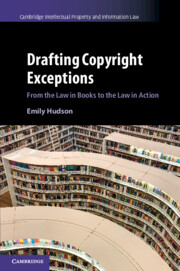Book contents
- Drafting Copyright Exceptions
- Cambridge Intellectual Property and Information Law
- Drafting Copyright Exceptions
- Copyright page
- Dedication
- Contents
- Preface
- Table of Cases
- Table of Statutes
- Part I Background
- 1 Introduction
- 2 Standards and Rules
- 3 Copyright and Cultural Institutions
- Part II The Law in Action
- Part III The Future
- Appendix Empirical Methodology
- Bibliography
- Index
- Cambridge Intellectual Property and Information Law
2 - Standards and Rules
from Part I - Background
Published online by Cambridge University Press: 31 March 2020
- Drafting Copyright Exceptions
- Cambridge Intellectual Property and Information Law
- Drafting Copyright Exceptions
- Copyright page
- Dedication
- Contents
- Preface
- Table of Cases
- Table of Statutes
- Part I Background
- 1 Introduction
- 2 Standards and Rules
- 3 Copyright and Cultural Institutions
- Part II The Law in Action
- Part III The Future
- Appendix Empirical Methodology
- Bibliography
- Index
- Cambridge Intellectual Property and Information Law
Summary
As seen in Chapter 1, discussion of the drafting options for copyright exceptions is often framed around the respective merits of general and specific provisions. This, in turn, is often presented as a choice between flexibility and certainty. One of main propositions in this book is that this approach, whilst containing some truths, is ultimately counterfactual and oversimplified. It is counterfactual because many claims about how exceptions ‘work’ are based on analysis that lacks systematic study of how stakeholders understand and apply the law, instead being drawn exclusively from the law in books. It is oversimplified because classification of a provision as general or specific is often undertaken with inadequate information and with certain characteristics simply asserted: flexibility, rigidity, certainty and so forth. As presented, it can seem that these characteristics are inevitable, invariable and mutually exclusive.
- Type
- Chapter
- Information
- Drafting Copyright ExceptionsFrom the Law in Books to the Law in Action, pp. 28 - 62Publisher: Cambridge University PressPrint publication year: 2020



